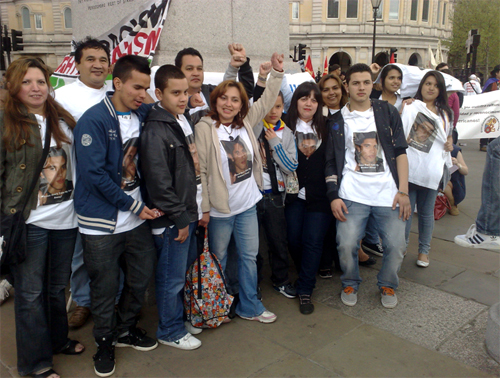
On the order of Home Office authorities, John Freddy Suarez faced deportation again this morning, Friday 24 June. Thankfully his deportation has now been stopped for a second time.
At 9pm last night legal attempts to get an injunction to suspend the deportation ended without success. John Freddy’s family were saddened and disappointed that once again a judge had overlooked the multiple irregularities of his case. At dawn on Friday, John Freddy was moved into isolation in the immigration detention centre where he is being held, ready to be transferred onto the Iberia flight from Heathrow which would return him to Colombia.
John Freddy’s family and friends were prepared for this outcome and prepared for action. In the preceding days, they coordinated a strategy of action via email, phone and facebook with acquaintances, organisations and anti-deportation campaigns. Information about John Freddy’s case was circulated and supporters were asked to ring and complain to Iberia airlines, which was due to transport him out the country, as well as his case officer at the Home Office. The family also contacted John Freddy’s GP and Members of Parliament.
They had T-shirts inscribed with John Freddy’s face, which were prepared for the previous attempt to deport him in 2009. They produced a leaflet to hand out at the airport check-in, appealing to other passengers of the Iberia flight to demand that the illegal deportation of John Freddy was abandoned. Family and friends left at dawn for Heathrow airport, ready to protest and determined not to lose their loved one through deportation.
John Freddy never arrived at Heathrow airport; was not put on the plane or deported. Once again we stopped the deportation of John Freddy. His lawyer has now filed an appeal with the High Court, giving us new hope that the threat of deportation will be removed.
John Freddy’s case involves a violation of basic human rights which we refuse to accept: 1) He is being punished twice for a criminal act that he has already served time for (aged 17) by being sentenced to prison and then being given an additional punishment of deportation. 2) It is against the principles of international law for a law to be applied retrospectively. The British government law to deport people with criminal records was passed a year and a half after John Freddy was sentenced. 3) The European Court has said that criminal acts committed by youngsters should not be treated as a criminal record, but as the basis on which to rehabilitate them into society.
Today’s victory is a collective victory and proof that we must never give up. The family take the opportunity to thank all those organisations, friends and acquaintances which gave assistance and support. This has been vital in maintaining our struggle. However, it is not over. At any moment the Home Office could issue a new deportation order. We will continue to fight against his deportation and push for a ruling on our appeal at the High Court and in the European Court of Human Rights.
In solidarity,
John Freddy’s family




